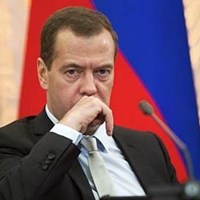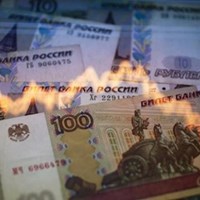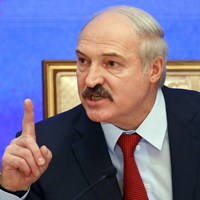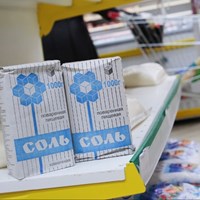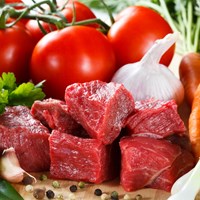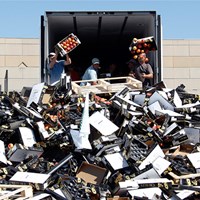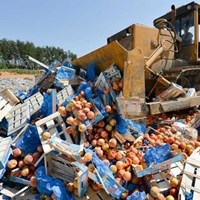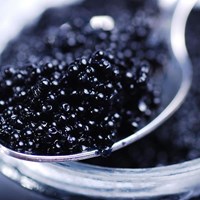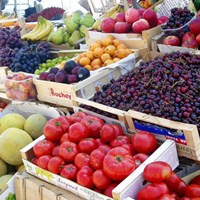Contents tagged with food embargo
-
Medvedev: Russia's food embargo will remain in place until the West's sanctions are lifted
Russia Prime Minister Dmitry Medvedev stated that Russia's food embargo will remain in force as a response to the West's sanctions, but the country must be prepared for the eventual resumption of a normalized market for agricultural products, TASS reported.
"We have retained these counter-moves so far. But all must be ready to see that sooner or later this period will end and an absolutely clean competitive field will appear once again," Medvedev stated.
"And by this time, it is necessary to …
-
Russia's Federal Anti-Monopoly Service says the state controls 70% of the Russian economy
There has been a state-monopolistic capitalism in Russia, according to a report by the Federal Anti-Monopoly Service, as reported by Vedomosti on 29 September. The distribution of government and state-owned companies in the GDP has increased to 70% from 35% in 2015, the document reads. The FAS notes an increased number of regional and municipal unitary enterprises which are the main enemies of competition in local markets.
The State is not going to abandon corporate control and wants to …
-
Lukashenko: Russia relies on Belarusian customs authorities to protect its interests
In defending its interests in the west, Russia relies on the assistance of customs authorities in Belarus, as Belarusian President Alexander Lukashenko stated during a working meeting with the chairman of the State Customs Committee of the Republic, Yuri Senko, BELTA reports.
“I’m interested in these worrisome facts. I want full information about the service we provide the Russian Federation (because only due to our customs is Russia able to defend its interests in the west and relies upon the …
-
Russia introduces embargo on Ukrainian salt
On Tuesday, September 13, Russia added salt to the list of foods prohibited from import into its territory as part of a food embargo, Interfax reports. The relevant resolution of the Russian government was published on the legal information portal of the Russian Federation. The restrictions take effect on November 1, 2016, and apply to Ukraine as well.
Traditionally, the Ukrainian company Artyomsol was a major supplier of Russia’s salt. The import of its products into the Russian Federation …
-
Russian government further limits food imports
The Russian government approved a list of 23 types of imported food that will be subject to restrictions. The list includes foods included in purchases for schools, kindergartens and other public institutions.
The list includes processed and preserved fish, caviar and caviar substitutes, crustaceans and mollusks, beef, veal, pork, poultry, milk and dairy products, as well as other food.
“Foods included in the list are produced in Russia and the EEU [Eurasian Economic Union] in sufficient …
-
Russian Duma proposes using seized food products to feed the poor
Anton Belyakov, a member of the Federation Council of Russia, has proposed that sanctioned food, which is set to be destroyed in Russia, be freely distributed to the needy. He introduced a corresponding bill to the State Duma.
Medusa reported that the bill proposes that sanctioned food, which still complies with sanitary and epidemiological requirements, “should be given out, free of charge, in aid of socially important needs”. This is due to the fact that the number of poor people in Russia …
-
Russia destroyed 7,500 tons of banned food imports
Russia’s Federal Service for Veterinary and Phytosanitary Surveillance (Rosselkhoznadzor) announced that over 7,500 tons of banned food products, mostly fruit and vegetables, were destroyed over the last year, Russian TASS news agency reported.
"Overall, 7,282 tons of vegetable products under sanctions have been destroyed from August 6, 2015 to date," Rosselkhoznadzor’s spokeperson Yulia Melano stated.
The representative added that fruits and animal products were also destroyed.
In July of …
-
Der Spiegel: Radioactive mineral water, milk with ammonia, and caviar with colibacillus is being sold in Russia
The fall in oil prices and the weakening of the ruble has led to the decrease of Russian consumers’ purchasing power. Producers are forced to reduce food prices while skimping on quality, according to revelations by Der Spiegel.
According to the newspaper, Russian producers use vegetable oil instead of animal fats and they violate safety regulations by selling radioactive mineral water, milk with ammonia and caviar infected with colon bacillus. Russia is actively using palm oil in the food …
-
Putin extends embargo on food from Western countries
On Wednesday, Russian President Vladimir Putin extended the food embargo on Western products.
“To extend the action of separate special economic measures from the 6th of August to the 31st of December 2017, envisaged by the Presidential Decree of 6th of August 2014 № 560 ‘On the use of special economic measures in order to ensure security of the Russian Federation’ and extended by the Presidential Decree № 320 of June 24th” a statement issued by the Kremlin read.
Russia imposed an embargo on …
-
Entrepreneurs can be fined up to ten thousand rubles for importing EU products into the Crimea
A fine of five to ten thousand rubles or administrative suspension of activity for up to ninety days can be imposed against entrepreneurs who have imported more than 15 tons of European fruit under the guise of Belarusian products into Crimea, as reported by the press service of the Russian Ministry of Internal Affairs of the Crimea.
"Administrative reports under Article 10.3 of the Code of Administrative Offences of the Russian Federation were filed againts the officials of the Crimean …
